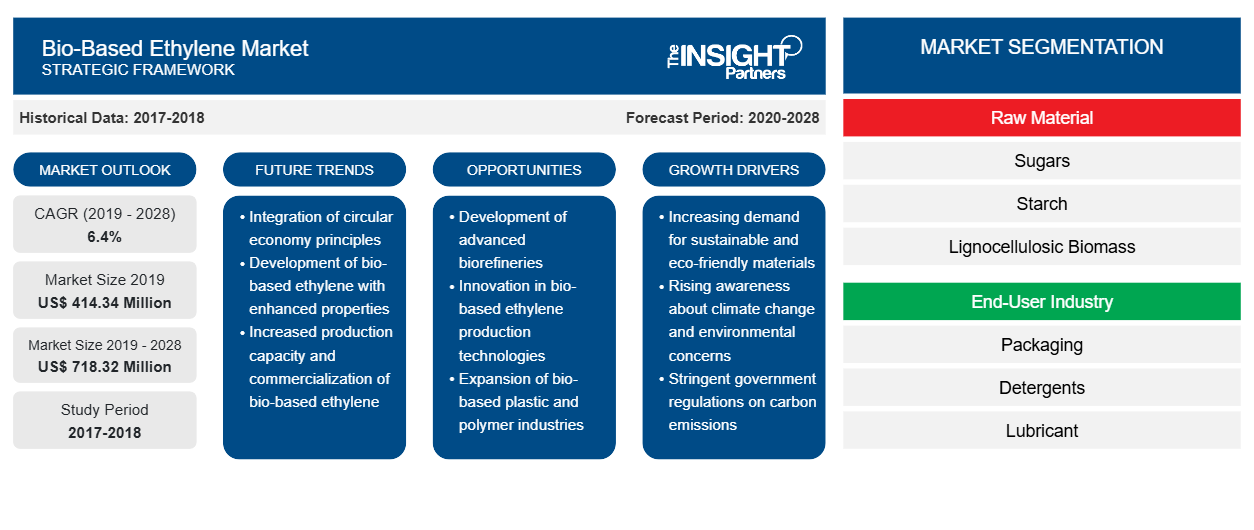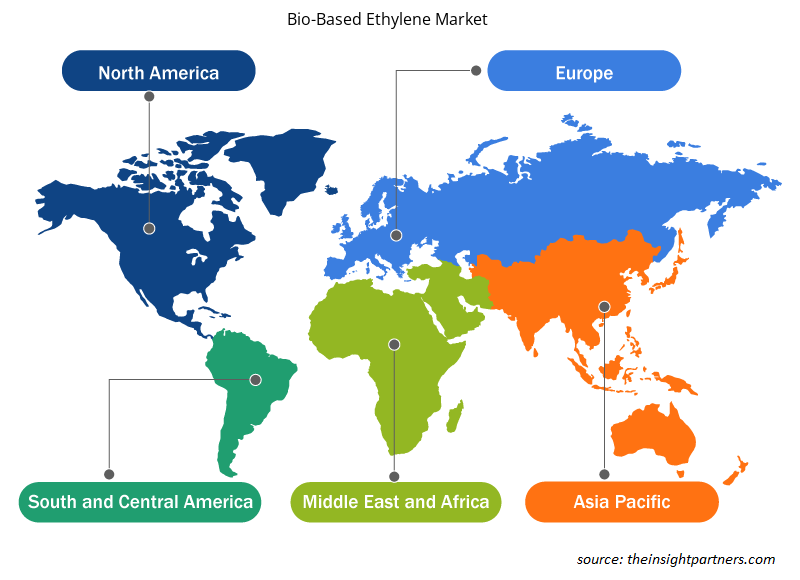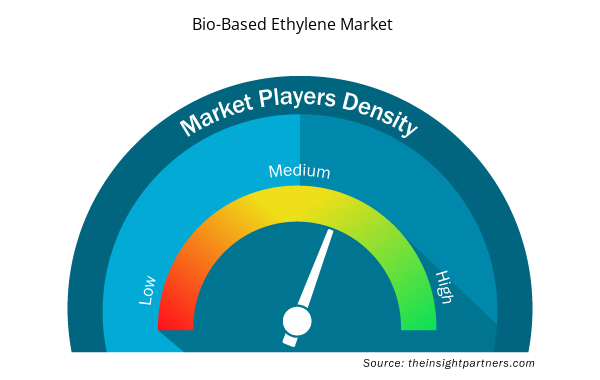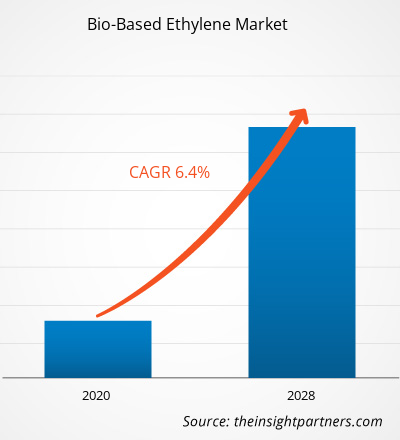The bio-based ethylene market was valued at US$ 414.34 million in 2019 and is projected to be worth US$ 718.32 million by 2028, growing at a CAGR of 6.4% during the forecast period.
Bio ethylene can be produced from biomass feedstock used for bio ethanol. Bio ethylene is now well known since it is used as a transportation fuel. Different types of natural resources such as sugars (sugarcane, sugar beets, and sweet sorghum), starch (corn and wheat), and lignocellulosic biomass (wood and grass), are used as raw materials in the production process. Bio ethylene is gaining importance from fuel additives, packaging, and detergent producing manufacturers. Industries looking for bio-based materials highly prefer utilizing bio ethylene in their products.
In 2019, Europe held the largest share of the global bio-based ethylene market and North America is estimated to register the fastest CAGR in the market over the forecast period. The largest market share of Europe is primarily attributed to the presence of major manufacturers such as The Dow Chemical Company, Oxy Low Carbon Ventures (OCLV), and Enerkem. North America is anticipated to account for a remarkable share of the bio-based ethylene market during the forecast period, owing to the wide applications of this material in packaging and plastic production industries located in this region. Bio-ethylene is manufactured from bio-based materials, including starch, sugars, and lignocellulosic biomass. Bioethanol is primarily utilized as a blend in transportation fuel, and it is further gaining importance in the automotive industry in this region, which is further influencing the market growth. The people living in North America and even the industry players are nowadays quite concerned about greenhouse gas emission; hence, they are adopting the bio ethylene as an alternative to petrochemical products. This is further bringing a positive outlook for the bio ethylene market in this region.
The ongoing pandemic has drastically altered the status of the chemicals & materials industry and has negatively impacted the growth of the bio-based ethylene market. The COVID-19 outbreak has interrupted the operational efficiency and agitated the value chains, owing to the sudden closure of national as well as international boundaries, creating revenue loss along with damage. The disruptive value chain has had a negative impact on the raw material supply, which, in turn, is impacting the growth of the bio-based ethylene market. However, as the economies are planning to revive their operations, the demand for bio-based ethylene is presumed to rise globally. During the pandemic, the demand for bio-based ethylene from the food packaging industry and consumer goods industry is rising since consumers are preferring to order goods online.
Further, positive measures have been taken by the governments of different countries such as partial lockdown, travel ban, and others, along with distributed generations & incorporation of advanced technology, which is another factor anticipated to bolster market growth. The safety measures followed by the companies include limiting direct contact with truck drivers & visitors, strengthening & communicating proper hygiene practices, and conducting complete sanitations & eliminating personnel contact during shift changes. With all these factors, it can be presumed that in post-pandemic times, the demand for bio-based ethylene from some application segments will take a hike.
Customize This Report To Suit Your Requirement
You will get customization on any report - free of charge - including parts of this report, or country-level analysis, Excel Data pack, as well as avail great offers and discounts for start-ups & universities
Bio-Based Ethylene Market: Strategic Insights

- Get Top Key Market Trends of this report.This FREE sample will include data analysis, ranging from market trends to estimates and forecasts.
Customize This Report To Suit Your Requirement
You will get customization on any report - free of charge - including parts of this report, or country-level analysis, Excel Data pack, as well as avail great offers and discounts for start-ups & universities
Bio-Based Ethylene Market: Strategic Insights

- Get Top Key Market Trends of this report.This FREE sample will include data analysis, ranging from market trends to estimates and forecasts.
Market Insights
Necessity for Diminishing Dependency on Fossil Fuels
Ethylene is used as a feedstock for many downstream chemical products. It is one of the largest bulk chemicals and is extensively used in the production of plastics. Due to the wide-scale applications of ethylene, its demand is likely to continue to rise in the coming years. Traditionally, ethylene is manufactured from petroleum derivatives, which is resulting in the depletion of fossil fuels. To overcome this problem, biomass feedstock is considered a reliable alternative for the manufacturing of bio-based ethylene. Bio-ethylene is produced from bioethanol, which is widely made using lignocellulose biomass such as wood, sugarcane, and corn-starch, thus, reducing the dependency on petroleum derivatives, as well as on fossil fuels. Bio-based products produced using local resources are also capable of cutting down a country’s dependency on fossil fuel imports, thereby stimulating the domestic economy.
Further, bio-based ethylene reduces greenhouse gas emissions both during production and use. However, the environmental performance of bio-ethylene principally depends on the regional conditions of the production of bioethanol, emission of greenhouse gases caused due to the changes in land usage, and conditions of the necessary energy systems. However, bio-based ethylene can significantly decrease the environmental impact of chemical industries. Thus, urgent need to reduce the dependency on fossil fuels and rise in awareness regarding environmental sustainability are bolstering the bio-based ethylene market growth. Bio-based ethylene and petroleum-based ethylene are chemically identical, and thus, the existing production capacities and equipment can be used to produce other downstream products, including plastics as usual, without having much impact on the existing market, which is another factor supporting the market growth.
Raw Material Insights
Based on raw material, the global bio-based ethylene market is segmented into sugars, starch, and lignocellulosic biomass. The sugars segment led the market with the largest share in 2019. Bio ethylene is produced from bioethanol, which is a liquid biofuel widely utilized in the transportation sector. Sugar from sugarcane is a highly utilized raw material while producing bio ethylene, mainly in India and Brazil. In Brazil, production of bioethylene is economically competitive, owing to the wider availability of cheap sugarcane feedstock. Sugarcane, sugar beets, and sweet sorghum are quite easy to break down since the sucrose is a disaccharide, which can be further directly fermented into bio ethanol utilizing yeast. Sugar based bio-ethylene production is estimated to save about 60% of fossil energy as compared to petrochemical production since the process can further produce electricity. The production cost of sugarcane-based bio-ethylene is also very low. The greenhouse gas emissions caused by using fossil fuel can also be minimized by utilizing bio ethylene in the petrochemicals industry. Due to these benefits, most of the industries are adopting bio ethylene for various applications.
End-User Industry Insights
In terms of end-use industry, the global bio-based ethylene market is segmented into packaging, detergent, lubricant, and additives. The packaging segment led the market with the largest share in 2019. Bio-based plastics or bioplastics are produced from renewable biological resources. For instance, sugar cane is mainly processed to prepare ethylene, which can further be utilized to manufacture polyethylene. Starch can also be processed to extract lactic acid and similarly polylactic acid (PLA). The properties of bioplastics can vary from material to material. Bio-based or partially bio-based durable plastics, such as PE, PET, or PVC, possess quite a similar property to their conventional versions. Bioplastics, including starch blends, bio-PE, PLA, and bio-PET are mostly utilized in packaging applications. They are also employed in fibers in the textiles industry. Succinic acid obtained from bio-based material is quite suitable for packaging and other applications. The growing preference among customers for decomposable polymers, owing to significant health issues caused by petrochemical products is a favorable factor to propel the product demand in packaging, as well as textiles applications.
Key players operating in the global bio-based ethylene market include Braskem SA, The Dow Chemical Company, LyondellBasell Industries Holdings B.V., SABIC, and Oxy Low Carbon Ventures (OCLV). Major market players are focused on strategies such as mergers and acquisitions and product launches to increase their geographical presence and consumer base globally. For instance, in April 2021, Oxy Low Carbon Ventures and a bio-engineering startup called Cemvita Factory announced the construction and operation of a one metric ton per month bio-ethylene pilot plant. This would be done by using a jointly advanced technology utilizing carbon dioxide (CO2) instead of hydrocarbon-sourced feedstocks.
Bio-Based Ethylene Market Regional Insights
The regional trends and factors influencing the Bio-Based Ethylene Market throughout the forecast period have been thoroughly explained by the analysts at Insight Partners. This section also discusses Bio-Based Ethylene Market segments and geography across North America, Europe, Asia Pacific, Middle East and Africa, and South and Central America.

- Get the Regional Specific Data for Bio-Based Ethylene Market
Bio-Based Ethylene Market Report Scope
| Report Attribute | Details |
|---|---|
| Market size in 2019 | US$ 414.34 Million |
| Market Size by 2028 | US$ 718.32 Million |
| Global CAGR (2019 - 2028) | 6.4% |
| Historical Data | 2017-2018 |
| Forecast period | 2020-2028 |
| Segments Covered |
By Raw Material
|
| Regions and Countries Covered | North America
|
| Market leaders and key company profiles |
Bio-Based Ethylene Market Players Density: Understanding Its Impact on Business Dynamics
The Bio-Based Ethylene Market market is growing rapidly, driven by increasing end-user demand due to factors such as evolving consumer preferences, technological advancements, and greater awareness of the product's benefits. As demand rises, businesses are expanding their offerings, innovating to meet consumer needs, and capitalizing on emerging trends, which further fuels market growth.
Market players density refers to the distribution of firms or companies operating within a particular market or industry. It indicates how many competitors (market players) are present in a given market space relative to its size or total market value.
Major Companies operating in the Bio-Based Ethylene Market are:
- Braskem S.A.
- The Dow Chemical Company
- LyondellBasell Industries Holdings B.V.
- SABIC
- Enerkem
Disclaimer: The companies listed above are not ranked in any particular order.

- Get the Bio-Based Ethylene Market top key players overview
Report Spotlights
- Progressive industry trends in the global bio-based ethylene market to help players develop effective long-term strategies
- Business growth strategies adopted by developed and developing markets
- Quantitative analysis of the market from 2017 to 2028
- Estimation of the demand for bio-based ethylene across various industries
- PEST analysis to illustrate the efficacy of buyers and suppliers operating in the industry to predict market growth
- Recent developments to understand the competitive market scenario and the demand for bio-based ethylene
- Market trends and outlook coupled with factors driving and restraining the growth of the bio-based ethylene market
- Decision-making process by understanding strategies that underpin commercial interest with regard to the global bio-based ethylene market growth
- Bio-based ethylene market size at various nodes of market
- Detailed overview and segmentation of the global bio-based ethylene market as well as its dynamics in the industry
- Bio-based ethylene market size in various regions with promising growth opportunities
Bio-Based Ethylene Market, by Raw Material
- Sugars
- Starch
- Lignocellulosic Biomass
Bio-Based Ethylene Market, by End-User Industry
- Packaging
- Detergent
- Lubricant
- Additives
Company Profiles
- Braskem SA
- The Dow Chemical Company
- LyondellBasell Industries Holdings B.V.
- SABIC
- Oxy Low Carbon Ventures (OCLV)
- Historical Analysis (2 Years), Base Year, Forecast (7 Years) with CAGR
- PEST and SWOT Analysis
- Market Size Value / Volume - Global, Regional, Country
- Industry and Competitive Landscape
- Excel Dataset



Report Coverage
Revenue forecast, Company Analysis, Industry landscape, Growth factors, and Trends

Segment Covered
Raw Material and End-User Industry

Regional Scope
North America, Europe, Asia Pacific, Middle East & Africa, South & Central America

Country Scope
Argentina, Australia, Brazil, Canada, China, France, Germany, India, Italy, Japan, Mexico, Russian Federation, Saudi Arabia, South Africa, South Korea, United Arab Emirates, United Kingdom, United States
Frequently Asked Questions
The major players operating in the global bio-based ethylene market are Braskem S.A., The Dow Chemical Company, LyondellBasell Industries Holdings B.V., SABIC, and Enerkem.
In 2020, Europe held the largest share of the global bio-based ethylene market. The largest market share of this region is primarily attributed to the presence of major manufacturers in the region. Also, the rising production activities of bio-based ethylene is expected to fuel the market growth during 2020–2028. Moreover, strict environmental regulations also promote the practice of producing biofuel and bio energy in the region. The increase in demand for alternative source of fossil fuel and growing demand for bi ethylene from plastic industry are further propels the growth of the bio-based ethylene market.
Bio-ethylene is produced from bioethanol, which is a liquid biofuel that is widely utilized in the transportation sector. Sugar from sugarcane is highly utilized raw material to produce bio ethylene mainly in India and Brazil. In Brazil, production of bio-ethylene is economically competitive owing to the wider availability of cheap sugarcane feedstock. Sugar from sugarcane, sugar beets, and sweet sorghum are quite easy to break down since the sucrose is a disaccharide, which can be further directly fermented into bio ethanol utilizing yeast. Sugar based bio-ethylene production is estimated to save about 60% of fossil energy as compared to petrochemical production since the process can further produce electricity. The production costs of sugarcane-based bio-ethylene is also very low. The greenhouse gas emissions caused for using fossil fuel can also be minimized while utilizing bio ethylene in petrochemicals industry. Due to these benefits, most of the industries are adopting bio ethylene for various applications.
Trends and growth analysis reports related to Chemicals and Materials : READ MORE..
The List of Companies - Bio-based Ethylene Market
- Braskem S.A.
- The Dow Chemical Company
- LyondellBasell Industries Holdings B.V.
- SABIC
- Enerkem
- Linde
- Shell Global
- TotalEnergies
- Axens
- Sigma-Aldrich

 Get Free Sample For
Get Free Sample For